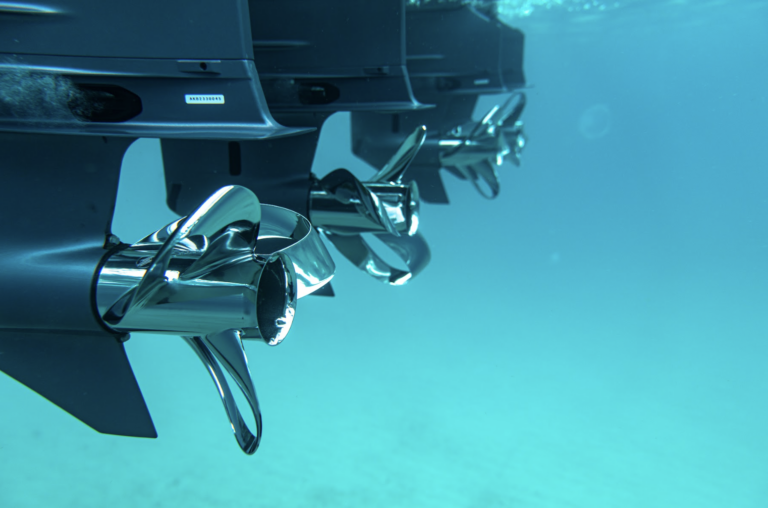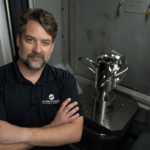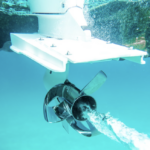
- Kim Kisner
- Business
- 01/14/2025
Sharrow Marine Designs to Reduce Noise, Fuel Use, Carbon Emissions

Sharrow Marine, headquartered in St. Clair Shores, Michigan, is focused on marine propulsion technology. In 2024, the company’s Sharrow Propeller™ was recognized as a finalist in Fast Company’s Best World Changing Ideas North America award category. The awards honor businesses and organizations that are developing creative solutions for “the most pressing issues of our time.”
SBND recently interviewed Greg Sharrow, CEO and inventor of the Sharrow Propeller, about the company’s technology and its impact on the environment and the marine industry.

Q: Tell us about Sharrow Marine and your propellers.
A: Sharrow Marine designs and manufactures propeller technology. Our propeller – recognized as the first major advancement in propeller design since the 1830s – eliminates the traditional propeller tip vortices, which are a major source of energy loss. This “tip-less” design leads to a 30% increase in efficiency and reduces underwater noise by up to 80%, making it quieter than conventional propellers.
From a sustainability standpoint, this means less fuel consumption, reduced noise pollution in marine environments, and lower carbon emissions.
Q: How does your propeller design directly impact sustainability in the marine industry?
A: Every one of our propellers is designed for a specific application, and our process allows us to predict thrust within these applications and design for maximum efficiency.
This, in turn, reduces the amount of fuel a vessel needs to operate. A lot of the fuel burned in the tanker industry, for example, is bunker fuel, which is a less refined, high-sulfur fuel. By reducing the fuel required, we not only cut carbon emissions but also reduce the pollutants entering the water. This approach creates a significant positive impact on the marine ecosystem.
Q: How does the increased fuel economy of your propellers translate to measurable reductions in carbon emissions?
A: The math is straightforward – burn less fuel and emit less carbon. Our propellers are about 30% more fuel-efficient, which means a corresponding 30% reduction in carbon emissions. For fleet operators and the recreational boating community, this translates to significant savings and a smaller environmental footprint.
Q: What challenges did you face in developing this product?
A: The biggest challenge was essentially rewriting the book on propeller design. We had to develop entirely new theories of operation and create software to test thousands of designs quickly. Assembling a team of engineers and software experts to write the code was a feat, but we now have an incredible team.
Another hurdle was manufacturing. Each propeller requires its own program and a multistep production process. Finding a manufacturing partner who could handle such complexity wasn’t easy. I traveled the world and ended up finding the right partner in my backyard, which is not surprising seeing as Detroit is the place for manufacturing.
We were fortunate to partner with Detroit Dynamics. They’ve been incredible in helping us establish a fully functional manufacturing facility here in Detroit.

Q: Beyond fuel efficiency and emissions, what other sustainability benefits does your propeller technology offer?
A: Noise reduction is a big one. The noise pollution in our oceans that is created by cavitation generated from traditional propellers has a devastating effect on marine wildlife. Our technology reduces underwater noise by 3–15 decibels on average, which helps protect marine ecosystems.
Additionally, all of our materials are sourced within the United States, further minimizing our carbon footprint and supporting local economies.
In terms of sustainability in Southeast Michigan, Detroit is integral to who we are. This city has a rich history of engineering and manufacturing expertise, and we’re proud to be a part of that legacy. All our propellers are manufactured here in Detroit, creating jobs and supporting the local economy.
Q: What opportunities does your technology present for fleet operators and recreational boaters?
A: For fleet operators, the savings in fuel costs are massive, and for recreational boaters, the benefits go beyond fuel efficiency. Our propellers reduce vibration and noise, improve high-speed control, and make docking in tight quarters much easier. For the average boater who logs about 52 hours a year, the return on investment starts the moment they turn the key.
Q: How do you see Sharrow Propellers contributing to the broader efforts to decarbonize the marine industry?
A: We’ve already established a strong footprint in the outboard motor market, but the inboard motor market – specifically for blue water and oceanic vessels – represents a massive opportunity. These vessels are some of the biggest polluters due to their reliance on bunker fuel. By applying our technology to this segment, we can significantly reduce sulfur emissions and improve fuel efficiency, effectively decarbonizing a critical part of the industry.
We’re also partnering with VEEM in Australia to bring our innovations to the global market and are in the process of growing to full production scale of the SHARROW by VEEM.
Q: Looking ahead, how do you see your propeller technology fitting into broader sustainability efforts?
A: We’ve been focused on the marine industry, but interestingly, the propeller was originally developed for use in the air. So, as we move forward, expanding into renewable energy applications is a priority. Whether it’s wind turbines, hydro-energy, or further innovations in marine propulsion, our goal is to make a meaningful impact on how energy is generated and consumed.
Be sure to subscribe to our newsletter for regular updates on sustainable business practices in and around Detroit.
Kim Kisner
- All
- Business
- Community
- Education
- Events

Unique Monique Scented Candles, a Detroit-based business founded by Monique Bounds., aims to produce candles and household products with clean ingredients and local supply chains. What began as a personal hobby during college has evolved into a full-time venture producing coconut oil and soy-based candles made with essential oils and locally sourced materials. SBN Detroit interviewed Bounds about launching a sustainable product line, sourcing challenges in Michigan, and...

Eastern Market Partnership, in collaboration with the City of Detroit’s Office of Sustainability Urban Agriculture Division, has announced $240,000 in grant funding to support Detroit-based farmers and farmer collectives. The grants will advance food access, climate education, sustainable land use, and economic opportunity, with priority given to Black- and Indigenous-led farms, youth-led initiatives, and projects rooted in historically disinvested neighborhoods. The recipients – ranging from cooperatives and community...

Citizen Robotics is a Detroit-based nonprofit that advances the use of robotics and digital manufacturing in residential construction, focusing on improving productivity, sustainability, and long-term affordability. Best known for its early work in 3D-printed housing, it explores how alternative construction methods and new financial models can reduce material waste, lower lifetime operating costs, and enhance the resilience of homes. SBN Detroit interviewed Tom Woodman, founder and president of...







